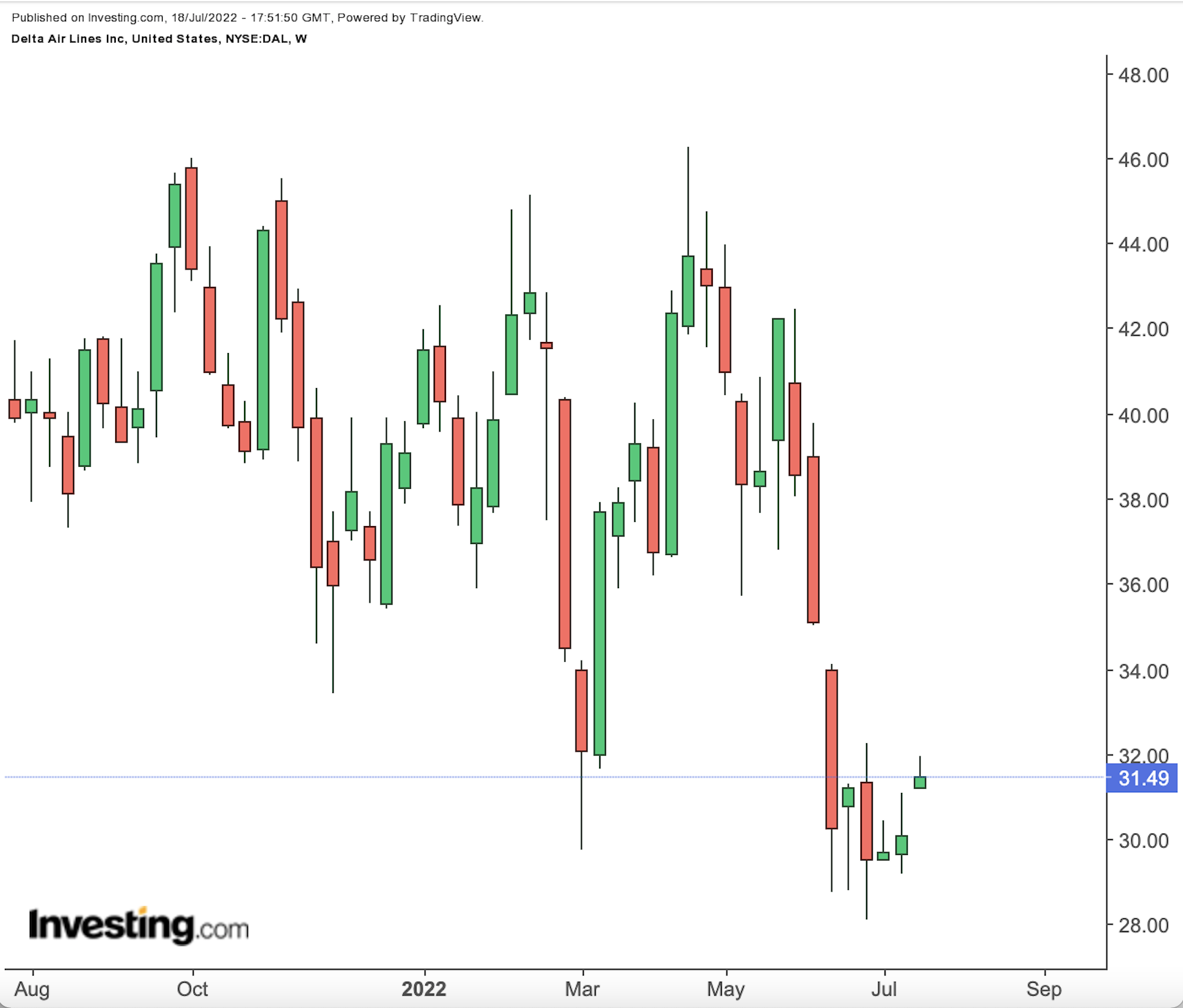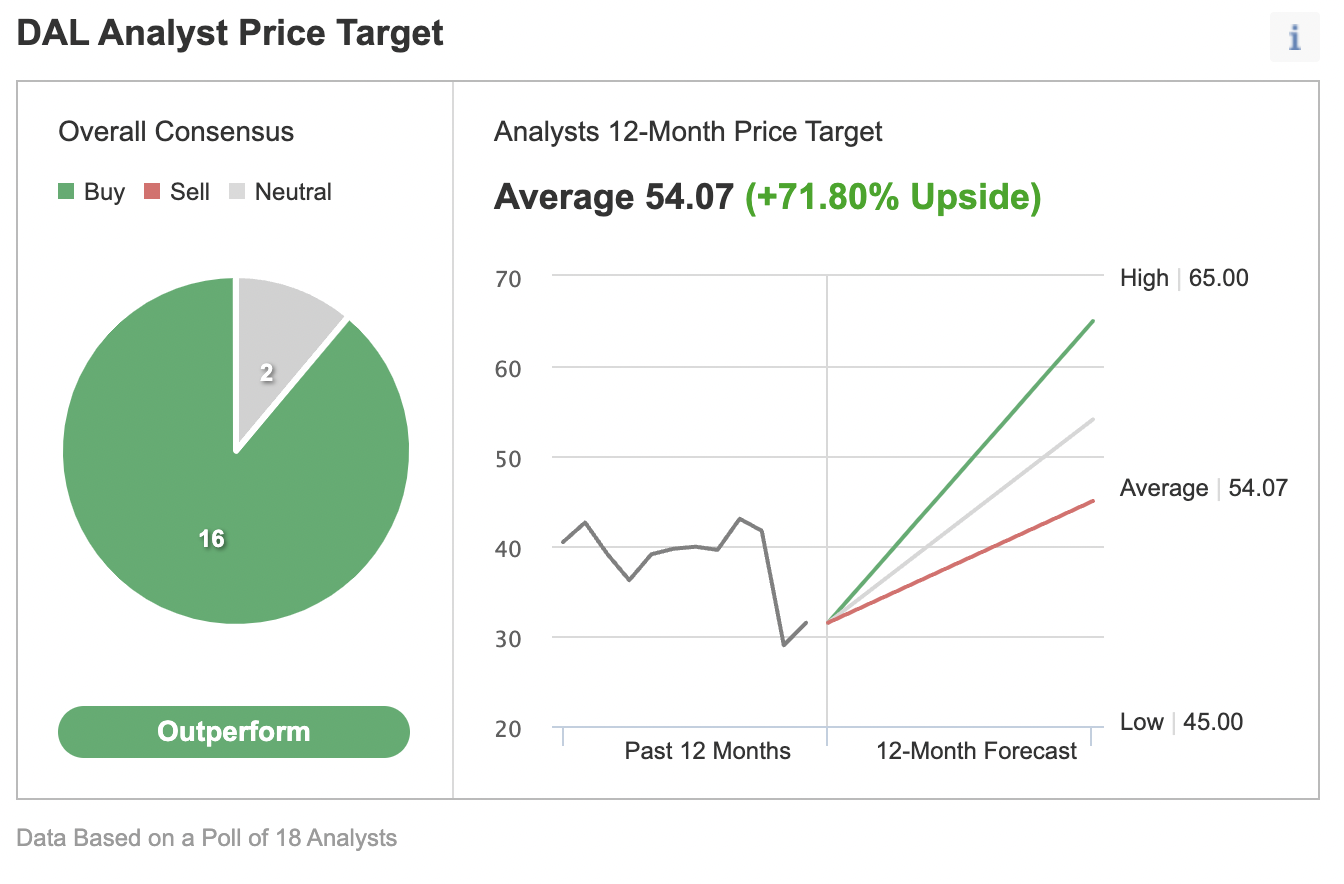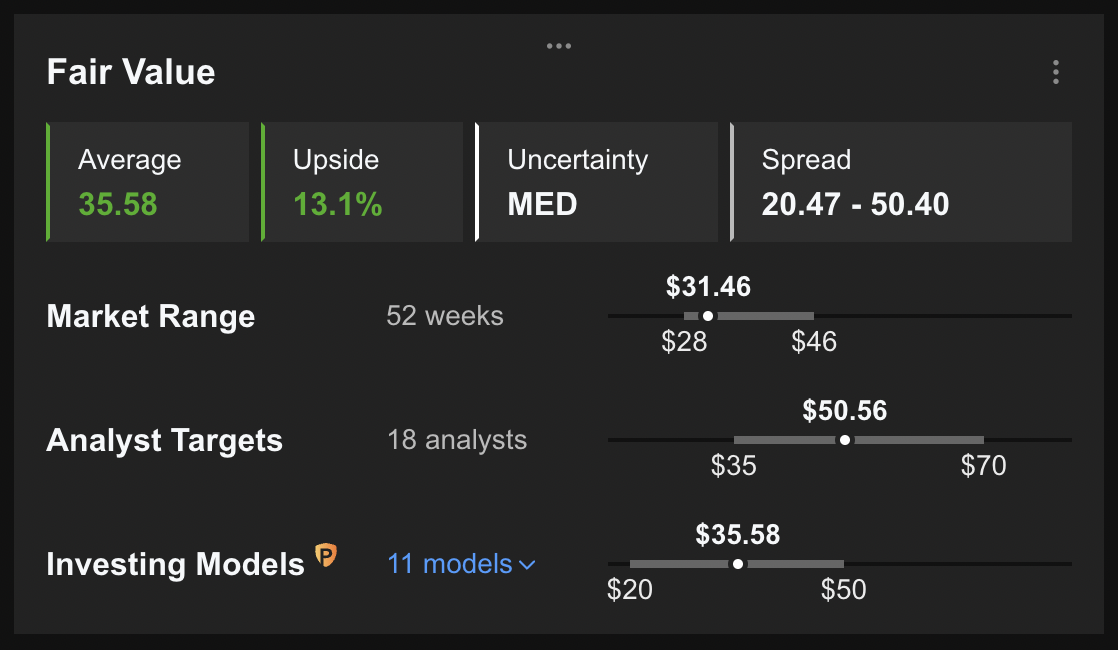- Delta Air Lines shares have lost 23% so far in 2022
- Despite increased demand for air travel, the industry continues to struggle with staffing issues and skyrocketing oil prices
- Long-term investors could consider buying DAL stock at current levels
Shareholders of the Atlanta-based Delta Air Lines (NYSE:DAL) have seen the value of their investment drop more than 27% over the past 52 weeks and 23% so far this year. By comparison, the S&P 500 Airlines Industry Index is down 15.6% in 2022. Meanwhile, the airline’s two major competitors – United Airlines (NASDAQ:UAL) and American Airlines (NASDAQ:AAL) – have lost 11.4% and 19.4%, respectively so far this year.

Source: Investing.com
On April 21, DAL shares went over $46, hitting a 52-week high. The stock’s 52-week range has been $28.09 - $46.27, while its market capitalization is $19.3 billion.
Despite the recent decline in share prices of airlines, there has been a significant increase in the number of air travellers in the U.S., according to the daily numbers released by the U.S. Transportation Security Administration (TSA).
For instance, on Saturday, July 16, the traveller throughput was 2,185,441. By comparison, 52 weeks ago on Saturday, the number was 1,979,981. In the early months of the pandemic in 2020, that number had dipped to 646,654.
However, the latest numbers are still less than 2,396,462 recorded in 2019.
Readers may be interested to know that DAL stock price back then was hovering around $57.
Recent Metrics
Delta released Q2 figures on July 13. Revenue stood at $13.8 billion, suggesting 10% growth compared with the pre-pandemic Q2 2019 period. Adjusted earnings per share (EPS) came in at $1.44, well below analyst forecasts and substantially under the level of $2.35 in Q2 2019. Delta Air Lines generated $1.6 billion of free cash during the quarter.
On the results, CEO Ed Bastian said:
“I would like to thank our entire team for their outstanding work…Their performance coupled with strong demand drove nearly $2 billion of free cash flow as well as profitability in the first half of the year, and we are accruing profit sharing, marking a great milestone for our people.”
Wall Street noted the increase in travel demand as well as unit revenue growth, which brought profitability in March. Delta also boasts impressive performance from its high-margin credit card partnership with American Express (NYSE:AXP). In Q2, spending levels on Delta co-branded AmEx cards were up by 43% compared with Q2 2019.
Management now expects Q3 capacity to come in around 83% to 85% of 2019 levels. Meanwhile, its operating margin is expected to be between 11% and 13%, compared with 11% in Q2 2022.
Prior to the release of the Q2 results, DAL stock was around $32. At the time of writing, it was trading at $30.09.
What To Expect From Delta Air Lines Stock
Among 18 analysts polled via Investing.com, DAL stock has a "outperform" rating, with an average 12-month price target of $54.07 for the stock. Such a move would suggest an increase of almost 80% from the current price. The 12-month price range stands between $45 and $65.

Source: Investing.com
Meanwhile, according to a number of valuation models, like those that might consider P/E or P/S multiples or terminal values, the average fair value for Delta Air Lines stock on InvestingPro stands at $35.58.

Source: InvestingPro
In other words, fundamental valuation suggests shares could increase more than 13%.
Our expectation is for DAL stock to build a base between $28 and $32 in the coming weeks. Afterwards, shares could potentially start a new leg up.
Adding DAL Stock To Portfolios
Delta Air Lines bulls who are not concerned about short-term volatility could consider investing now. Their target price would be $35.58 as indicated by quantitative models.
Alternatively, investors could consider buying an exchange-traded fund (ETF) that has DAL stock as a holding. Examples include:
- U.S. Global Jets ETF (NYSE:JETS)
- Defiance Hotel, Airline, and Cruise ETF (NYSE:CRUZ)
- iShares Transportation Average ETF (NYSE:IYT)
- Invesco S&P 500® Equal Weight Industrials ETF (NYSE:RGI)
- First Trust Nasdaq Transportation ETF (NASDAQ:FTXR)
Finally, those who are experienced with options could also consider selling a cash-secured put option in Delta Air Lines stock. Such a bullish trade could especially appeal to those who want to receive premiums (from put selling) or to possibly own DAL shares for less than their current market price of $30.17.
Most option strategies are not suitable for all retail investors. Therefore, the following discussion on DAL stock is offered for educational purposes and not as an actual strategy to be followed by the average retail investor.
Cash-Secured Puts On Delta Air Lines
Price Now: $30.09
Let's assume an investor wants to buy DAL stock, but does not want to pay the full price of $30.09 per share. Instead, the investor would prefer to buy the shares at a discount within the next several months.
One possibility would be to wait for DAL stock to fall further, which it might or might not do. The other possibility is to sell one contract of a cash-secured DAL put option.
So the trader would typically write an at-the-money (ATM) or an out-of-the-money (OTM) put option and simultaneously set aside enough cash to buy 100 shares of the stock.
Let's assume the trader is putting in this trade until the option expiry date of Sept. 16. As the stock is $30.09 at time of writing, an OTM put option would have a strike of $28.
The DAL Sept. 16, 28.00-strike put option is currently offered at a price (or premium) of $1.60.
An option buyer would have to pay $1.60 X 100, or $160, in premium to the option seller. This premium amount belongs to the option seller no matter what happens in the future. It is also the seller’s maximum gain. The put option will stop trading on Friday, Sept. 16.
If the put option is in the money (meaning the market price of DAL stock is lower than the strike price of $28) any time before or at expiration on Sept. 16, this put option can be assigned. The seller would then be obligated to buy 100 shares of DAL stock at the put option's strike price of $28 (i.e. at a total of $2,800).
The break-even point for our example is the strike price ($28) less the option premium received ($1.60), i.e., $26.40. This is the price at which the seller would start to incur a loss.
Bottom Line
Cash-secured put selling is a moderately more conservative strategy than buying shares of Delta Air Lines outright at the current market price. This can be a way to capitalize on the choppiness in DAL stock in the coming weeks.
Investors who end up owning DAL shares as a result of selling puts could further consider setting up covered calls to increase the potential returns on their shares. Thus, selling cash-secured puts could be regarded as the first step in Delta Air Lines stock ownership.
